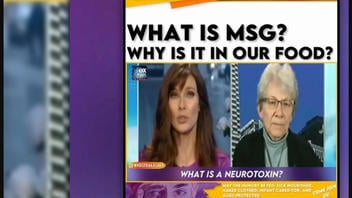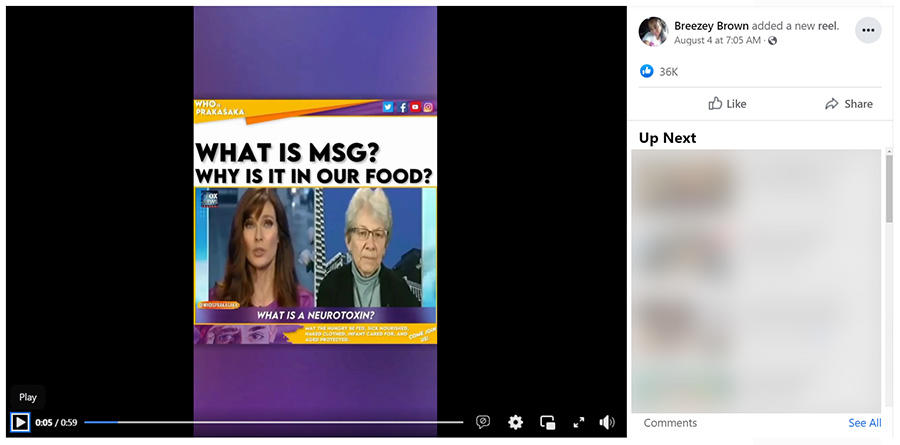
Is monosodium glutamate (MSG) a neurotoxin that will kill brain cells and cause headaches, migraines, learning disabilities and Lou Gehrig's Disease? No, that's not true: The alarming message in this video is not supported by the U.S. Food and Drug Administration, which classifies the food additive to be "generally recognized as safe" (or GRAS, the commonly used FDA acronym for that classification). Some people have reported symptoms from consuming MSG, but there has not been conclusive peer-reviewed evidence that these symptoms are directly linked to MSG. Glutamic acid is a naturally occurring substance that is found in many foods like mushrooms, tomatoes and cheese. It is chemically indistinguishable from the manufactured flavor-enhancing additive.
This segment of "A Healthy You & Carol Alt" originally aired on the Fox News network on January 25, 2014. A short clip of spliced together pieces of that segment, was posted on Instagram on August 1, 2022. A copy of that video was posted as a reel on Facebook on August 4, 2022. The caption on the video reads:
WHAT IS MSG?
WHY IS IT IN OUR FOOD?
@whoisprakasaka
WHAT IS A NEUROTOXIN?
MAY THE HUNGRY BE FED, SICK NOURISHED, NAKED CLOTHED, INFANT CARED FOR, AND AGED PROTESTED.
COME JOIN US!
This is how the post appeared at the time of writing:
(Image source: Facebook screenshot taken on Fri Aug 26 20:14:41 2022 UTC)
MSG is considered safe by international food safety authorities, in Europe, Australia, New Zealand and in the United States. The U.S. Food & Drug Administration (FDA) has a fact sheet on the food additive monosodium glutamate, which explains:
FDA considers the addition of MSG to foods to be "generally recognized as safe" (GRAS). Although many people identify themselves as sensitive to MSG, in studies with such individuals given MSG or a placebo, scientists have not been able to consistently trigger reactions.
The FDA fact sheet finishes by explaining that adverse event reports have not been conclusively tied to MSG:
Over the years, FDA has received reports of symptoms such as headache and nausea after eating foods containing MSG. However, we were never able to confirm that the MSG caused the reported effects.
These adverse event reports helped trigger FDA to ask the independent scientific group Federation of American Societies for Experimental Biology (FASEB) to examine the safety of MSG in the 1990s. FASEB's report concluded that MSG is safe. The FASEB report identified some short-term, transient, and generally mild symptoms, such as headache, numbness, flushing, tingling, palpitations, and drowsiness that may occur in some sensitive individuals who consume 3 grams or more of MSG without food. However, a typical serving of a food with added MSG contains less than 0.5 grams of MSG. Consuming more than 3 grams of MSG without food at one time is unlikely.
The original segment of "A Healthy You & Carol Alt," as it was posted on YouTube on January 26, 2014, is 5 minutes and 54 seconds long. This article will refer to timestamps in the segment as it appears on YouTube. It was edited down to 0:59 seconds in the Instagram reel that makes the claims that MSG is harmful. The clip in the reel uses a custom border and additional captioning added by @whoisprakasaka. The maximum length for reels on Facebook is 60 seconds, on Instagram this limit has recently been extended to 90 seconds. The editing did not dramatically alter the context of the original segment, but it did remove some of the qualifying words used by Alt when she said at 0:44 seconds:
These toxins, they kill cells in them and while they are doing that they cause headaches, they cause migraines,and of course long-term use of these things can cause learning disabilities. I heard also it's a precursor to, or it stimulates the brain, and that can cause Lou Gehrig's disease. I mean the list goes on and on. So why is this in food?
Lou Gehrig's Disease, or amyotrophic lateral sclerosis (ALS) is not caused by MSG in the diet -- nor can cutting MSG out of the diet cure ALS. Glutamate occurs naturally in foods and is also made by the body. The food additive MSG does not cross the blood-brain barrier. The ALS Association offers a summary on glutamate, and a fact sheet about ALS from the Muscular Dystrophy Association discusses glutamate toxicity -- neither of the two medical associations suggests that ALS is caused by the food additive MSG. From the Muscular Dystrophy Association fact sheet:
Glutamate is one of many neurotransmitter chemicals in the nervous system that carries signals between nerve cells. There is some evidence that in ALS glutamate accumulates in the spaces around a nerve cell after it has completed its signaling function, causing problems for the nerve cells in its vicinity. The problem could be caused by inadequate transport of glutamate away from the cells.
The show's host, Carol Alt, is a model, author, and according to her author's biography, "one of the raw food movement's most recognized advocates." The guest in this segment is Adrienne Samuels, cofounder of the nonprofit advocacy organization Truth in Labeling Campaign, which focuses on MSG. The "About" section of the website describes the organization's mission:
The Truth in Labeling Campaign was incorporated in 1994 as a nonprofit organization dedicated to securing full and clear labeling of all processed food. We are an all-volunteer group funded entirely through donations. Neither our staff nor our directors are paid. We rent no offices, and we use no professional fund raisers. Even the cost of disseminating information is primarily borne by volunteers.
...
The first (and ongoing) project of The Truth in Labeling Campaign (TLC) was to secure identification of processed free glutamic acid (MSG) whenever and wherever it occurs. For over 30 years, concerned consumers have tried to work with the FDA to resolve this identification issue, but have found no evidence that the FDA is ever going to act on their behalf. It appears that only through a true grassroots effort might the FDA's refusal to require labeling of MSG be resolved.
After introductions, Alt leads off at 0:17 seconds asking and then answering her own question:
Why don't we start with what MSG is. It's monosodium glutamate and it is a neurotoxin. What is a neurotoxin?
Samuels responds at 0:24 seconds:
A neurotoxin is a substance that will stimulate brain cells to the point of killing them repeated powerful stimulation and when applied enough to receptors the cells, the neurons die.
In a fact sheet on the naturally occurring amino acid glutamate published by the Cleveland Clinic, the essential roles it plays in brain function are enumerated. It's needed for functions such as learning and memory, energy for brain cells, as a chemical messenger, to regulate the sleep-wake cycle and to signal pain. While glutamate is essential, too much can cause damage or death of brain cells. The Cleveland Clinic lists some conditions caused by the damage from the overexcitement of nerve cells caused by too much glutamate -- ALS, multiple sclerosis and Alzheimer's disease top the list. This does not mean that these conditions are caused by MSG in the diet.
A 2018 review article published in the Annals of Nutrition and Metabolism is titled, "Monosodium Glutamate in the Diet Does Not Raise Brain Glutamate Concentrations or Disrupt Brain Functions." This article was written by John D. Fernstrom, a professor of psychiatry, pharmacology and chemical biology at the University of Pittsburgh. The article was presented at the 2018 Dietary Glutamate Workshop which was "organized and sponsored by the International Glutamate Technical Committee to provide a platform for a broad expert discussion on all relevant aspects of glutamate metabolism and safety in human nutrition." In the article Fernstrom describes some of the flaws of past MSG studies which relied on tests injecting massive doses of MSG into rodents and how these studies do not represent how dietary glutamate is metabolized by humans. The article's abstract explains:
Glutamate's neurotransmitter role was discovered only in the last 60 years. Its inclusion in foods has necessitated its safety evaluation, which has raised concerns about its transfer into the blood ultimately increasing brain glutamate levels, thereby causing functional disruptions because it is a neurotransmitter. This concern, originally raised almost 50 years ago, has led to an extensive series of scientific studies to examine this issue, conducted primarily in rodents, non-human primates, and humans. The key findings have been that (a) the ingestion of MSG in the diet does not produce appreciable increases in glutamate concentrations in blood, except when given experimentally in amounts vastly in excess of normal intake levels; and (b) the blood-brain barrier effectively restricts the passage of glutamate from the blood into the brain, such that brain glutamate levels only rise when blood glutamate concentrations are raised experimentally via non-physiologic means. These and related discoveries explain why the ingestion of MSG in the diet does not lead to an increase in brain glutamate concentrations, and thus does not produce functional disruptions in brain.
Lead Stories reached out to the ALS Association for comment and will update this article if appropriate.
















